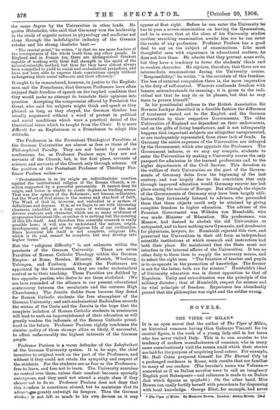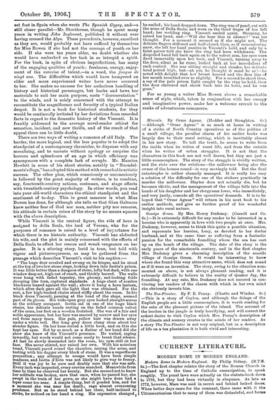NOVELS.
THE VIPER OF MILAN.*
IT is an open secret that the author of The Viper of Milan, an historical romance having Gian Galeazzo Visconti for its central figure, is the work of a young lady still in her teens who has never visited Italy. This is to run counter to the tendency of modern manufacturers of romance, who in many cases conscientiously visit the scenes amid which their stories are laid for the purpose of acquiring local colour. For example, Mr. Hall Caine prepared himself for The Eternal City by a prolonged residence in Rome, with results that are familiar to many of our readers. (The heroine's name was Volonna- somewhat as if an Italian novelist were to call an imaginary English poet Bakespeare—and reference is made to an Italian dish which figures as spighetti.) On the other hand, Miss Bowen can easily fortify herself with precedents for dispensing with local knowledge. George Eliot, for example, had never • Tim Viper of Milan. By Marjorie Bowen. London: Alston Rivers. [684 set foot in Spain when she wrote The Spanish Gypsy, and—a still closer parallel—Mr. Shorthonse, though he spent many years in writing lohn Inglesant, published it without ever having crossed the Alps. These precedents, however, excellent
as they are, would probably not have sufficed by themselves for Miss Bowen if she had not the courage of youth on her side. If she were ten years older, we doubt whether she would have embarked on her task in so intrepid a spirit.
For the book, in spite of obvious imperfections, has many of the engaging qualities of youth : freshness, energy, enjoy-
ment of the exercise of talent,—in a word, the fougue de vingt ans. The difficulties which would have hampered an older and more experienced writer have never occurred
to her. She makes no excuses for her audacious handling of history and historical personages, but hacks and hews her materials to suit her main purpose, casts " documentation " to the winds, and is solely concerned with the attempt to reconstitute the magnificence and ferocity of a typical Italian despot. It is not a book for historical students, for they would be continually irritated by her deviations from recorded facts in regard to the domestic history of the Visconti. It is frankly addressed to the average novel-reader athirst for sensation, incident, and new thrills, and of the result of that appeal there can be little doubt, There are two ways of writing a romance of old Italy. The harder, the more logical, and the less popular is to adopt the standpoint of a contemporary chronicler, to dispense with any moralising, and to narrate without apology or surprise the horrors and splendours of an age in which efficiency was synonymous with a complete lack of scruple. Mr. Maurice Hewlett in some of his short stories, notably in " Buondel- monte's Saga," has adopted this method with remarkable artistic success. The other plan, which consciously or unconsciously is followed by the great majority of writers, is to combine, say, fourteenth-century actions, costumes, and stage effects with twentieth-century psychology. In other words, you read into your old-world characters the ethical standpoint and the sentiment of to-day. This in great measure is what Miss Bowen has done, for although she tells us that Gian Galeazzo knew neither fear of God nor man, neither pity nor remorse, his attitude in certain crises of the story by no means squares with the above description.
While Visconti is the central figure, the role of hero is assigned to della Scala, the lord of Verona, who for the purposes of romance is raised to a level of init=tance for which there is no historic authority. Visconti has abducted his wife, and the plot is mainly concerned with the efforts of Della Scala to effect her rescue and wreak vengeance on her gaoler. It is a stirring story, lurid in tone, but told with vigour and picturesqueness, as may be gathered from the passage which describes Visconti's visit to his captive :—
" The huge door creaked and swung on its hinges, and he stood at the top of two low stone steps, looking down into Isotta's prison. It was little better than a dungeon of stone, lofty but dark, with one window deep set, high out of reach, and thickly barred. The walls were hung with faded tapestry, the gloomy, sad-looking folds drooping like torn, captured standards. A huge chest of sombre blackness leaned against the wail; above it hung a horn lantern, which after dark gave all the light that was obtained. For the rest, a few high-backed chairs stood stiffly about the room. In his black dress Visconti, pausing at the bead of the steps, seemed part of its gloom. His wide-open grey eyes looked straight across at the solitary occupant. 'sotto sat in one of the huge black chairs, her delicate hands resting on the faded crimson velvet of the arms, her feet on a wooden footstool. She was of a fair and noble appearance, but her face was marred by sorrow and her eyes red from many tears. Her pale, yellow hair was drawn away under a white veil. Her long grey dress clung close about her slender figure. On her knee rested a little book, and on this she kept her eyes. Not by so much as a flutter of her hand did she show she knew of the Visconti's presence. He waited, raging inwardly, but words would not come easily to break that silence. At last he slowly descended into the room, his eyee still on her face. She never stirred, nor raised her own. With his noiseless tread, Visconti paced round the chamber, raising the arras, and testing with his dagger every block of stone. It was a superfluous precaution ; any attempt to escape would have been simple madness, and Isotta d'Este was not likely to give way to frenzy. Still it was joy to be sure and doubly sure that she was safe. Every inch was inspected, every crevice searched. Meanwhile from time to time he observed her keenly. But she seemed not to know her solitude was broken, save that once, when he passed her, she swept in the train of her gown, as she might have done had a leper come too near. A simple thing, but it goaded him, and for a moment she was near her death; rage almost overcoming prudence. But as he stood behind her chair, half-inclined to strike, he noticed on her hand a ring. His expression changed; he smiled; his hand dropped down. The ring was of pearl, out with the arms of Della Scala, and worn on the third finger of her left hand ; her wedding ring. Visconti smiled again. Stooping, ho raised her hand, and—` Will she bear this in silence ? ' was his thought. For a moment it seemed as if she might not. The delicate fingers stiffened and half-closed, then, as if remembering anew, she left her hand passive in Visconti's hold, and only by a faint quiver told she knew the ring had been withdrawn. The despoiled hand fell back again on to the velvet arm, her eyes were fixed immovably upon her book, and Visconti, turning away to the door, silent as he came, looked back at her incredulous of such control. She was sitting straight and slender, her delicate head poised high, but—ah yes, he thought it must be so !—ho noted with delight that her breast heaved and the firm line of her mouth trembled ever so slightly. For a second he stood thus, a ray of the pale prison light caught by the ring he held, then the door clattered and shook back into its bolts, and he was gone."
For so young a writer Miss Bowen shows a remarkable sense of style, which, taken in conjunction with her energy and imaginative power, make her a welcome recruit to the ranks of adventurous romancers.















































 Previous page
Previous page